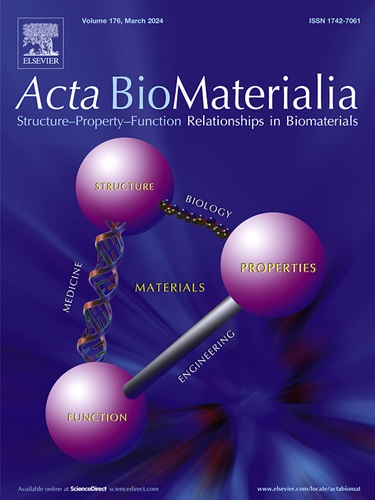Injectable antioxidant hyaluronan/chitosan hydrogel as a platelet-rich plasma and stem cell carrier to promote endometrial regeneration and fertility restoration
IF 9.4
1区 医学
Q1 ENGINEERING, BIOMEDICAL
引用次数: 0
Abstract
Severe damage to the uterine endometrium can lead to thin endometrium and intrauterine adhesions (IUAs), resulting in infertility or complications during pregnancy. Therapies utilizing mesenchymal stem cells (MSCs) and platelet-rich plasma (PRP) represent promising strategies for restoring thin endometrium. However, the low homing rate and functionality of transplanted cells, along with the rapid release of PRP growth factors, limit their therapeutic efficacy. In this study, we developed an in-situ formable and redox-responsive hydrogel composed of thiolated hyaluronan (tHA) and thiolated chitosan (tChi) (tHA-tChi) for encapsulating PRP and mouse adipose-derived stem cells (ADSCs). Our results demonstrate that the tHA-tChi hydrogel exhibits appropriate swelling, injectability, self-healing, and antioxidant properties, alongside a sustained release of PRP growth factors. In vitro experiments indicated that the PRP and ADSCs encapsulated within the hydrogel (ADSCs/tHA-tChi/PRP) stimulated angiogenesis in endothelial cells. In a mouse model of thin endometrium, the ADSCs/tHA-tChi/PRP significantly enhanced endometrial regeneration, as evidenced by increased endometrial thickness and reduced fibrosis. This improvement markedly enhanced endometrial receptivity and pregnancy rates in damaged endometria, correlating with increased angiogenesis and endometrial cell proliferation via activation of the VEGF/AKT/BAD pathway, as shown by Western blotting assays. Overall, the combination of antioxidant hydrogel, PRP, and ADSCs demonstrates promising potential for promoting endometrial regeneration and restoring fertility, offering new minimally invasive therapeutic options for endometrial diseases.
Statement of significance
This research presents a potent approach to the treatment of thin endometrium, employing an injectable, biodegradable and antioxidant hydrogel comprising thiolated hyaluronic acid (tHA) and thiolated chitosan (tChi). The antioxidant capacity of the hydrogel improves the oxidative microenvironment of the injured uterus, while the hydrogel is designed to release adipose-derived stem cells (ADSCs) and growth factors from platelet-rich plasma (PRP) sustainably, promoting tissue regeneration by enhancing angiogenesis and endometrium cell proliferation. Demonstrated efficacy in a mouse model of thin endometrium indicates its great potential to significantly improve fertility restoration treatments. The administration of antioxidant hydrogel containing ADSCs and PRP represents a promising therapeutic strategy for patients with endometrial disease.

求助全文
约1分钟内获得全文
求助全文
来源期刊

Acta Biomaterialia
工程技术-材料科学:生物材料
CiteScore
16.80
自引率
3.10%
发文量
776
审稿时长
30 days
期刊介绍:
Acta Biomaterialia is a monthly peer-reviewed scientific journal published by Elsevier. The journal was established in January 2005. The editor-in-chief is W.R. Wagner (University of Pittsburgh). The journal covers research in biomaterials science, including the interrelationship of biomaterial structure and function from macroscale to nanoscale. Topical coverage includes biomedical and biocompatible materials.
 求助内容:
求助内容: 应助结果提醒方式:
应助结果提醒方式:


